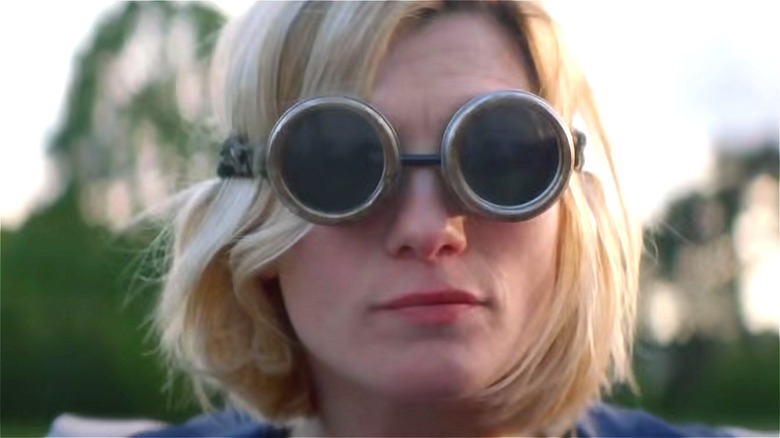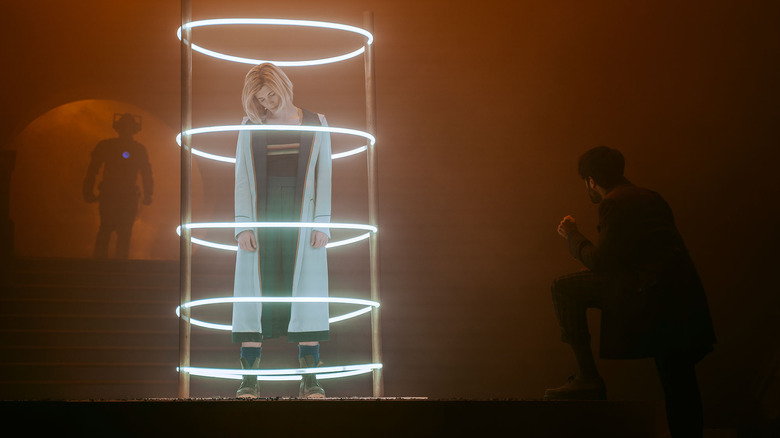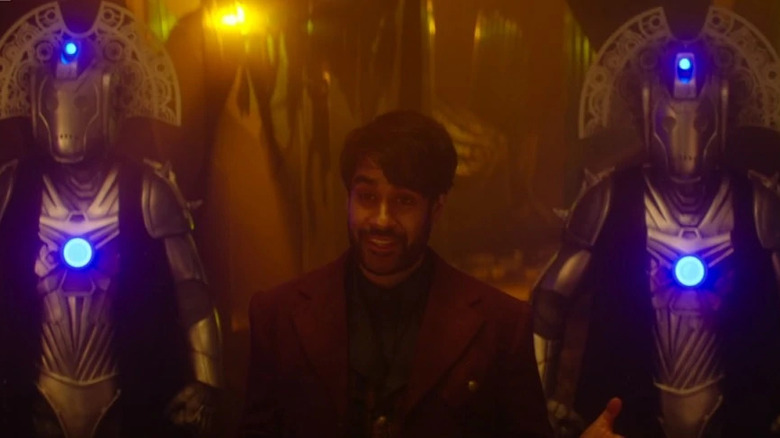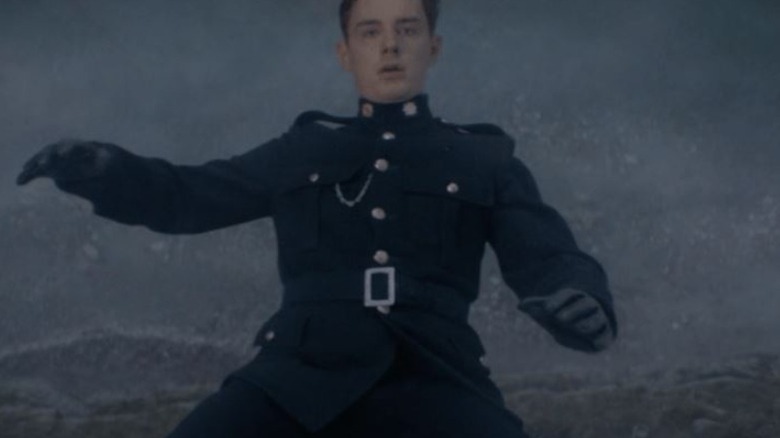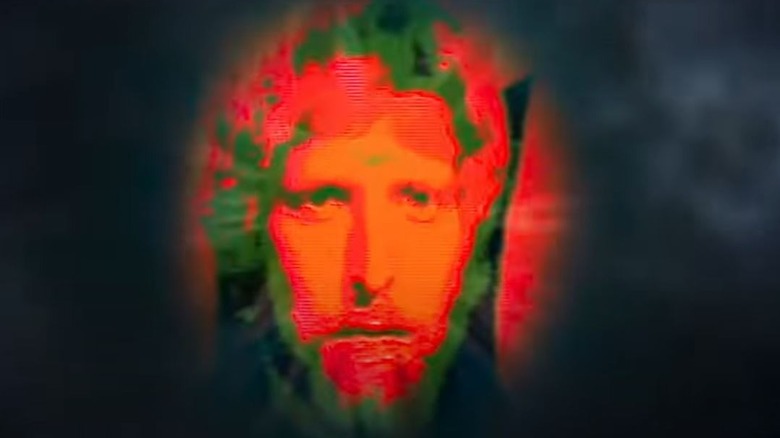The Ending Of Doctor Who Season 12 Explained
"Doctor Who" has turned the old "the more things change, the more they stay the same" adage into an art form. Both classic and modern runs of the sci-fi show have constantly tweaked with cast, themes, and approach, but by and large, the overarching theme of a reincarnating Time Lord using their wits to battle evil forces has remained constant.
Well, up to the show's Series 12, that is. From familiar villains to strange places and neat run-ins with historical figures, showrunner Chris Chibnall's second season at the "Doctor Who" helm features many elements that are familiar to longtime fans of the show. However, it eventually becomes evident that the stakes are even higher than usual. The season ends in a typical out-of-the-blue setup for an upcoming special episode — this time, the Thirteenth Doctor (Jodie Whittaker) is unexpectedly incarcerated by a Judoon patrol. However, before that cliffhanger, she has discovered things that seem destined to turn her life and some of the basic tenets of the show upside down, possibly for good. Let's take a look at the ending of the 12th Season of "Doctor Who," and what it might mean to the future of the show.
The Doctor's identity crisis
The biggest takeaway from the ending of "Doctor Who" Season 12 is that the Doctor isn't who you thought her to be. Up to this episode and regardless of the regeneration, the whole point of the character has been that they're a rogue member of the Time Lord race, who wanders the universe and its various eras in a stolen TARDIS vessel, fighting evil and injustice every step of the way.
Yeah, that's all in the past now. As the Doctor's nemesis, the Master (Sascha Dhawan), reveals, the Doctor is actually a mysterious Timeless Child entity from an unknown reality. They've been around for an unspecified, yet truly impressive amount of time, and they're actually the very source of the Time Lords' classic "12 regenerations" power. What's more, the Doctor used to be affiliated with some sort of Time Lord black ops squad called the Division, which implies a darker past than you'd expect from the pacifist hero. All of this means that the Doctor's lived through a whole bunch more lives than the ones depicted on the show — including Season 12 newcomer Ruth (Jo Martin), the mystery Doctor introduced in "Fugitive of the Judoon."
Making the Doctor far, far older than has been previously assumed — and, even more shockingly, not a Time Lord at all — effectively upends decades of lore. It's a pretty bold creative choice from Chibnall, and it remains to be seen whether future showrunners will adhere to this drastic change in the Doctor's background and nature. Judging by the fact that the season's final episode, "The Timeless Children," is the worst "Doctor Who" finale according to IMDb, fans certainly don't seem to appreciate the change.
The Master at his most masterful
The Doctor ultimately takes the whole Timeless Child reveal surprisingly well, but the same can't be said about the Master. Like the Doctor, the power-hungry antagonist has had many incarnations in the show, and while they've been wildly different, they all have one thing in common: They have an almost pathological need to one-up the Doctor, who foils them at every turn. As such, the villain doesn't exactly love the news that the Doctor's on a level that's officially far beyond his reach. Worse still, the Timeless Child reveal means the Master himself is basically just piggybacking on the Doctor's innate, far superior powers.
Despite this considerable gut punch, the attention-grabbing villain would no doubt be delighted to realize that few "Doctor Who" seasons have devoted more attention to the Master than this one. He's effectively the main character of a large portion of "The Timeless Children," and even before that, the season delivers a truly quintessential Master storyline. He hides behind a disguise, reveals himself in a delightfully dramatic fashion, and has a complex plot that plays out over the course of the season, even though it's not always on the forefront. His cruel actions against the Gallifreyans would make the Harold Saxon version of the character (John Simm) proud, and by taking control of the Cyberman AI Cyberium and creating an army of Time Lord Cybermen, he unveils what could be his most dangerous plan yet.
Considering that he quite likely managed to survive the destruction of Gallifrey, and that the Timeless Child situation gives him more reason to hate the Doctor than ever, it will be truly fascinating to see what the Master does next.
A memory revealed
Due to its highly Gallifrey-centric nature, the biggest beats of the season's ending more or less sideline many characters who aren't explicitly affiliated with Time Lords. While the Doctor's companions and guest characters have a meaty side plot aboard the Cyber-carrier, their plotline is ultimately pretty cut and dry "adventures on a spaceship" fare — apart from Ko Sharmus (Ian McElhinney), who makes the finale's biggest heroic sacrifice. The dangerous semi-Cyberman Ashad (Patrick O'Kane) also sees his threat level go down the drain. At the end of the day, the creepy villain only serves as the means to deliver the Death Particle and Cyberium to Gallifrey, and the Master swiftly deals with him ... which, in all fairness, is pretty much par for the course for any villain who coexists in a "Doctor Who" episode with the devious Time Lord.
However, one bit character from the penultimate episode does get an interesting conclusion in the finale. The Irish abandoned child Brendan (Evan McGabe) — who becomes a Garda officer, escapes seemingly fatal injury unharmed, and ultimately has his memory wiped by those he trusted — doesn't actually exist. Instead, his tale turns out to be a corrupted memory shorthand for the Doctor's own experiences before the mysterious Division did a similar memory wipe to her. Hinting at the Doctor's life before the First Doctor incarnation with a seemingly unrelated story like this is an interesting concept, which may be something the show could further explore in the future. Wouldn't it be cool to find out more about the Doctor's wiped memories with parables featuring, say, vikings or 1970s detectives?
The ending sneakily explains an old Doctor Who mystery
Before the ending of Season 12, it was believed that the Doctor was only able to breach the Time Lords' 12-regeneration limit because the Gallifreyans gifted the Eleventh Doctor (Matt Smith) a brand new 12-pack of lives in 2013's "The Time of the Doctor." However, even before that, there have been hints that the Doctor has access to more than the established amount of regenerations. In fact, one particular story during the show's classic run heavily implied that William Hartnell's First Doctor wasn't, well, the first Doctor.
This happened all the way back in 1976, in an episode called "The Brain of Morbius." During a mental duel between the Fourth Doctor (Tom Baker) and the consciousness of a Time Lord called Morbius (voiced by Michael Spice), eight previously unseen faces appear in a context that makes them seem like former Time Lord reincarnations. The nature of the faces has been somewhat shrouded in mystery, though the implication seems to be that they're the Doctor's reincarnations before the First Doctor. The show's producer at the time has confirmed that this is indeed the correct interpretation (via the Radio Times).
As eagle-eyed viewers note, the "Morbius Doctors" briefly show among the Thirteenth Doctor's many flashbacks when she breaks out of the Matrix in "The Timeless Children." This, it seems, pretty much confirms that these eight mystery faces are indeed the Doctor's earlier reincarnations. Considering how many questions the ending of "Doctor Who" Season 12 leaves viewers with, it's nice that at least this one old mystery is finally solved.
